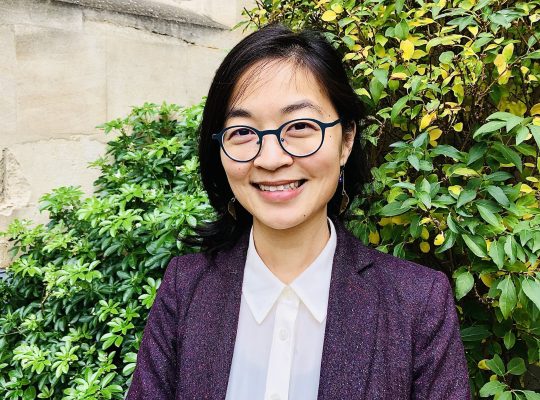
Academic Background
Betina graduated from University College London with an MSc in Neuroscience. She then obtained a DPhil degree at Oxford, during which she focussed on attentional modulations on binocular vision using non-invasive MR imaging. During her postdoctoral training, she made contributions to understanding how functional paradigms and neurochemistry via MR Spectroscopy measurements can be exploited to study visual perception. In 2020, Betina was awarded a Royal Society Dorothy Hodgkin Research Fellowship to establish her own research programme at the Wellcome Centre for Integrative Neuroimaging, part of the Nuffield Department of Clinical Neurosciences. Her research focuses on investigating plasticity in the human binocular visual system in health and disease.
Research Description
Our reality exists in three-dimensions, and binocular vision enables us to interact with the world with precision. The goal of my research is to better understand the neural basis of binocular vision, from acquisition to perception.
My research focuses on two core questions:
- What are the neural mechanisms supporting binocular vision, in particular stereoscopic depth perception?
- What signals regulate the acquisition of binocular vision through experience?
To answer these questions, my group specializes in combining behavioural psychophysics with non-invasive imaging of brain function, in particular measures of neurochemistry using novel magnetic resonance spectroscopy techniques. These signals give us rich information about the state of the brain during vision and learning.
There are strong reasons for why this research is relevant: impaired binocular vision due to amblyopia, also known as ‘lazy eye’, is the most common visual problem in children. It can lead to a lifetime of impaired vision. If we can understand how the brain combines images from two eyes, then we can use this knowledge to help people with visual problems see better.
Undergraduate Teaching
Psychology
Neuroscience
FHS projects
Postgraduate Teaching
I offer MSc Neuroscience projects
Please get in touch with me to discuss potential DPhil projects
Research Interests
I am a vision scientist, though I am widely interested in anything that relates to sensory processing and the brain. My core research interests are in binocular vision, neural plasticity and neurochemistry.
Other Interests
I am a keen photographer, writer and illustrator. I have written an illustrated book about the brain for children, inspired by the curiosity of my daughter Bianca. I have two children.
Selected Publications
See full list of publications here.
- Ip, I.B., Bridge, H. Investigating the neurochemistry of the human visual system using magnetic resonance spectroscopy. Brain Struct Funct 227, 1491–1505 (2022). https://doi.org/10.1007/s00429-021-02273-0
- Ip IB, Emir UE, Parker AJ, Campbell J, Bridge H. Comparison of Neurochemical and BOLD Signal Contrast Response Functions in the Human Visual Cortex. J Neurosci. 2019 Oct 2;39(40):7968-7975. doi: 10.1523/JNEUROSCI.3021-18.2019. Epub 2019 Jul 29. PMID: 31358655; PMCID: PMC6774413.
- Ip IB, Berrington A, Hess AT, Parker AJ, Emir UE, Bridge H. Combined fMRI-MRS acquires simultaneous glutamate and BOLD-fMRI signals in the human brain. Neuroimage. 2017 Jul 15;155:113-119. doi: 10.1016/j.neuroimage.2017.04.030. Epub 2017 Apr 19. PMID: 28433623; PMCID: PMC5519502.
Accessible articles
- Betina Ip, Holly Bridge; Learning to see in 3D with two eyes: the role of experience, plasticity and neurochemistry. Biochem (Lond) 21 October 2020; 42 (5): 12–17. doi: https://doi.org/10.1042/BIO20200059
Links
See also Dr Ip’s departmental profile on the Nuffield Department of Clinical Neurosciences website.
